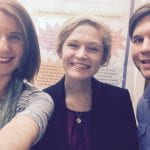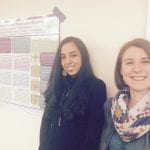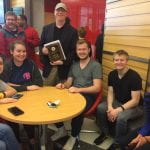Courses for physics majors
I often teach Modern Physics at Texas State University. The course includes an introduction to quantum mechanics, nuclear physics, and special relativity at the majors level. Frequent small group discussion in class are guided by materials from the Tutorials on Thinking about Quantum Entities, the New Model Course in Applied Quantum Mechanics, and the Tutorials in Introductory Physics (for relativity in particular). This class also makes frequent use of relevant PhET simulations and adapted/invented activities to support students’ reasoning around these.
I also sometimes teach Physics / STEM Cognition and Pedagogy as part of the Physics Learning Assistant Program / STEM Communities Project, and I co-taught a new interdisciplinary Ethics, Science, and Society course with Dr. Brianne Gutmann through the Honors College at TXST.
Introductory astronomy for non-majors
I taught introductory astronomy for non-majors (“Astro 101”) twice as the lead instructor at the University of Maryland while I was a graduate student. I incorporated various interactive teaching strategies into my instruction and make frequent use of instructional resources from the Center for Astronomy Education website, as well as the Lecture-Tutorials for Introductory Astronomy workbook. I also mentored and worked with three undergraduate teaching assistants who received training in pedagogy through the University of Maryland Learning Assistant program.
Astronomy courses for majors
At Texas State, I helped to design a methods in observational astronomy course for the Spring 2020 semester.
At the University of Maryland, I was significantly involved in the teaching of the two-semester introductory course sequence for astronomy majors, first as a teaching assistant, then as a lead co-instructor, and lastly as a team member/advisor on a multi-year course redesign project. The materials we developed for the lab portion of the course, as well as more holistic descriptions of the course redesign, can be found on Derek Richardson’s website.
- Me with my Astro 101 Learning Assistants (Sarah, Justin, and Fatima).
- Derek receiving an award for his teaching/our course redesign, with some of his students.




